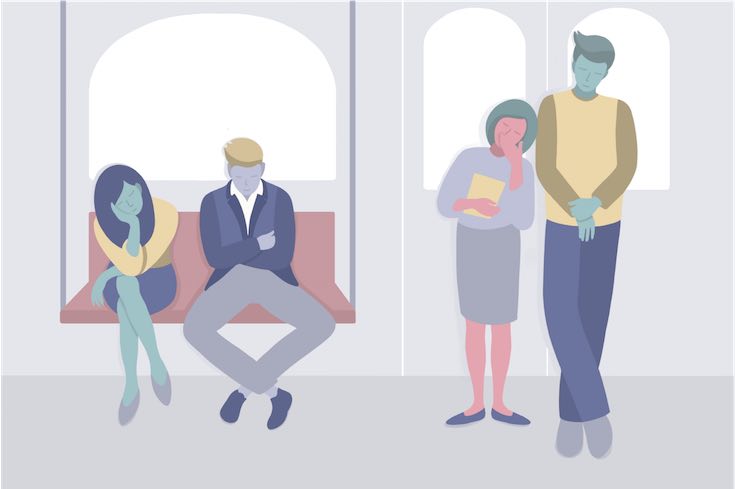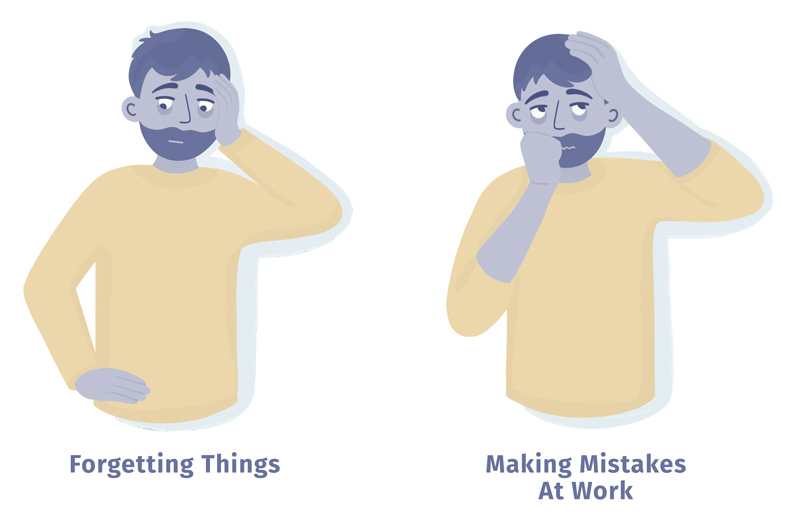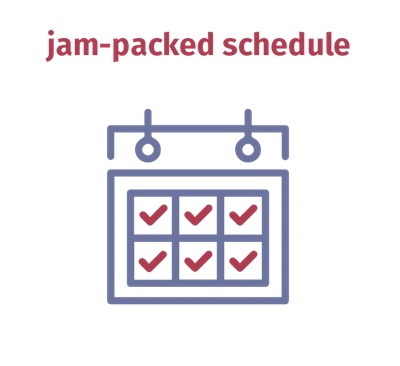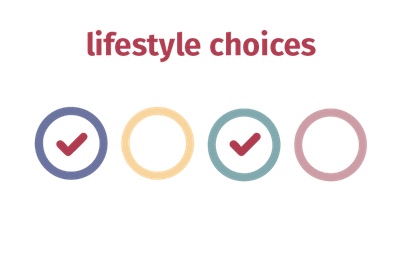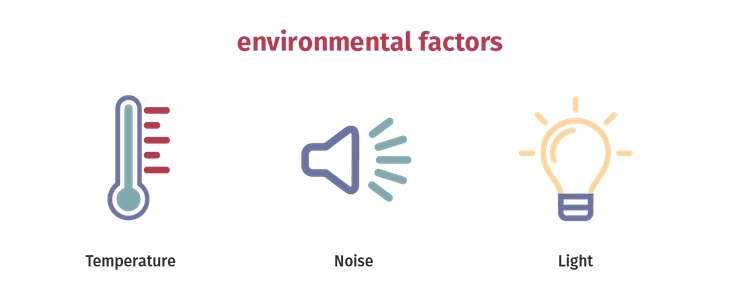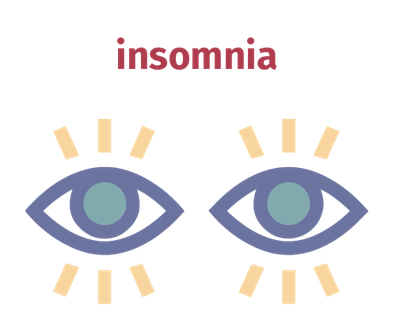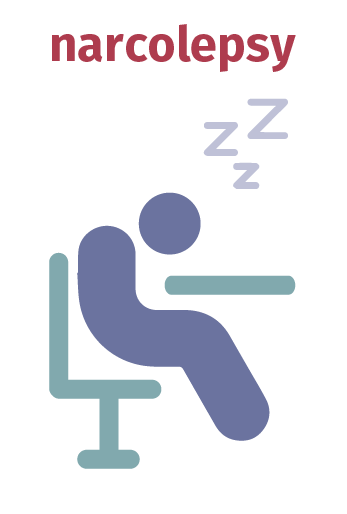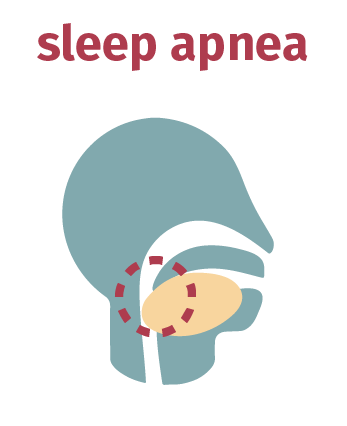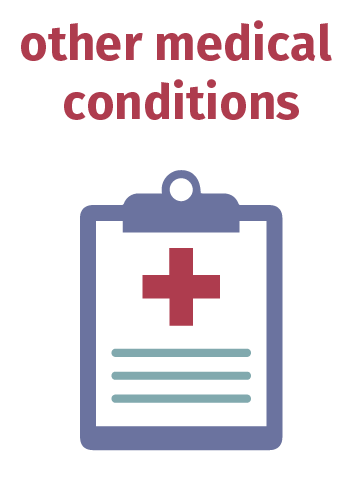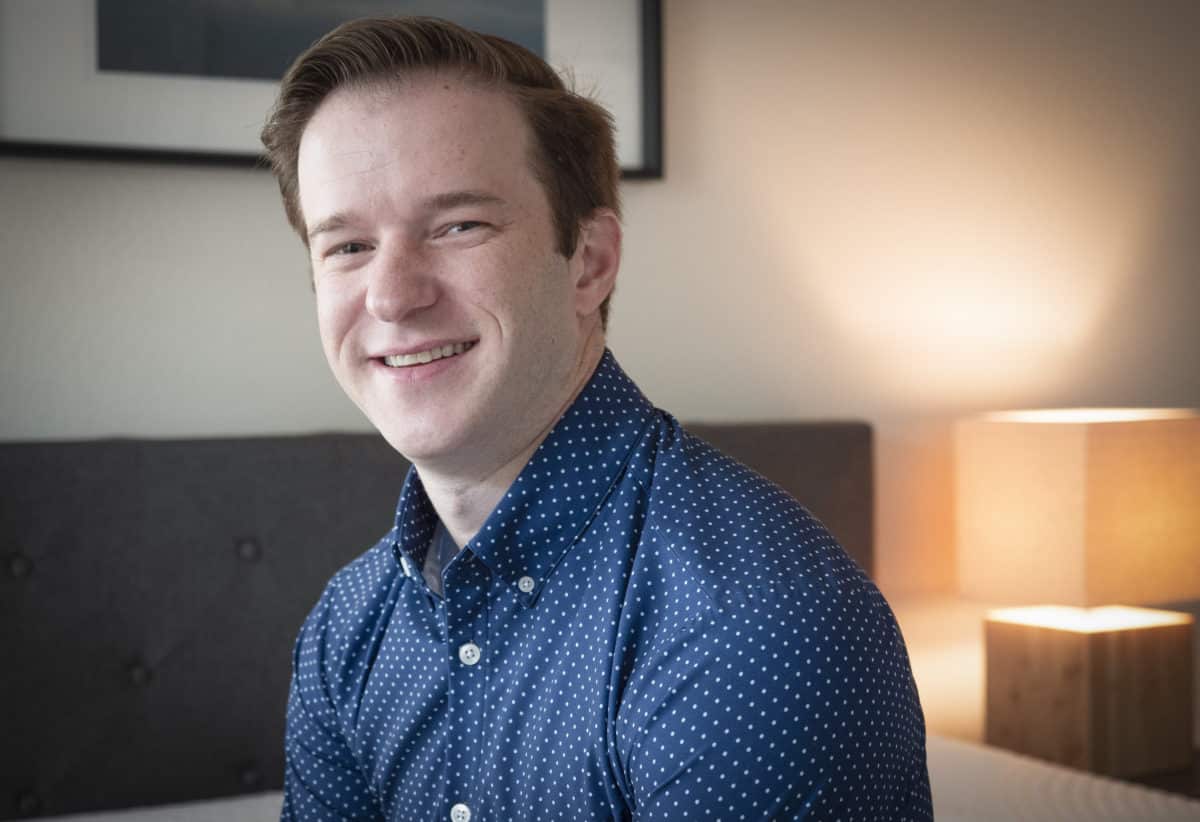Let’s face it: People in the U.S. are really tired… like, all the time.
The morning lines in coffee shops get super long as people wait for their caffeine hit before work. Commuters doze off on the train or bus on the daily. And for many Americans, taking a second to sit down on the couch after a long day might accidentally segue into an unexpected nap.
The long and short of it? Due to a range of factors, including busy schedules and widespread health problems, a vast number of people in the U.S. simply aren’t getting enough sleep. In fact, in 2014 the Centers for Disease Control and Prevention (CDC) declared insufficient sleep a public health epidemic. In our view, one of the best antidotes to sleep deprivation is education. The more you know about the potential causes, symptoms, consequences, preventative measures, and treatment options for sleep deprivation, the better equipped you will be to enjoy sound sleep on a regular basis. In that spirit, here’s everything you need to know about sleep deprivation.
In our view, one of the best antidotes to sleep deprivation is education. The more you know about the potential causes, symptoms, consequences, preventative measures, and treatment options for sleep deprivation, the better equipped you will be to enjoy sound sleep on a regular basis. In that spirit, here’s everything you need to know about sleep deprivation.
What Is The Definition Of Sleep Deprivation?
The American Sleep Association (ASA) defines sleep deprivation as “the cumulative effect of a person not having sufficient sleep.”
Translation: You are sleep-deprived if you don’t get enough sleep.
This is true no matter whether it takes place in a short-term scenario (such as feeling sleep-deprived after pulling an all-nighter to cram for a test) or over the long-term (such as consistently not getting enough sleep due to a long commute, family obligations, or demanding work hours).
Sleep deprivation tends to result in predictable consequences, which we’ll detail below. These consequences provoke many of the noticeable symptoms of sleep deprivation.
Is Sleep Deprivation A Disorder?
Sleep deprivation isn’t a sleep disorder. Instead, it’s something that sleep disorders and other medical conditions can cause.
For example, sleep disorders such as insomnia, restless leg syndrome and narcolepsy can all provoke sleep deprivation — but sleep deprivation is a side effect of these disorders; it isn’t a disorder in and of itself.
Sleep deprivation can also occur without any link to a sleep disorder. For example, people can become sleep deprived when their schedules don’t allow them to sleep enough, regardless of any medical condition or sleep disorder.
How Common Is Sleep Deprivation?
The short answer: Very common. A recent sleep survey from SingleCare found that it takes 1 in 5 people three or more hours to fall asleep and 77% of Americans experience one or more sleep disturbance during the night.
The CDC estimates that one-third of American adults get less than seven hours of sleep each night, compared to the recommended seven to nine hours. This helps explain why the American Sleep Association found that 37.9 percent of adults have unintentionally fallen asleep during the day at least once in the previous month.
Translation: A large number of Americans are sleep-deprived on a regular basis.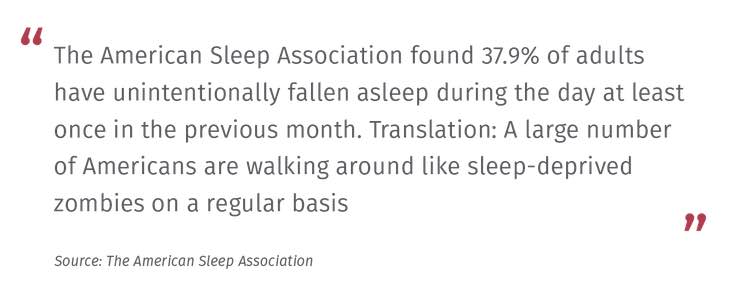
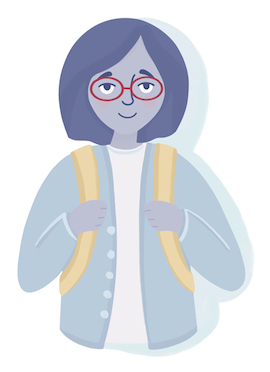 A quick note here: It’s important to remember that there’s no universally “perfect” amount of sleep — everyone is different. The Mayo Clinic says adults usually need seven to nine hours of sleep each night, but some people may need more sleep than that, while others may function fine on less. It’s important to understand that “enough sleep” is a personal measure, which means people who need a ton of sleep may feel sleep deprived even if they get seven or eight hours each night.
A quick note here: It’s important to remember that there’s no universally “perfect” amount of sleep — everyone is different. The Mayo Clinic says adults usually need seven to nine hours of sleep each night, but some people may need more sleep than that, while others may function fine on less. It’s important to understand that “enough sleep” is a personal measure, which means people who need a ton of sleep may feel sleep deprived even if they get seven or eight hours each night.
Sleep deprivation isn’t just an issue for adults. Teenagers across America are also extremely sleep-deprived. Stanford Children’s Health estimates that 70% of teenagers aren’t getting the recommended 8 to 10 hours of sleep each night.
According to the Stanford Medicine News Center, sleep deprivation puts teenagers at an increased risk of “inability to concentrate, poor grades, drowsy-driving incidents, anxiety, depression, thoughts of suicide and even suicide attempts.”
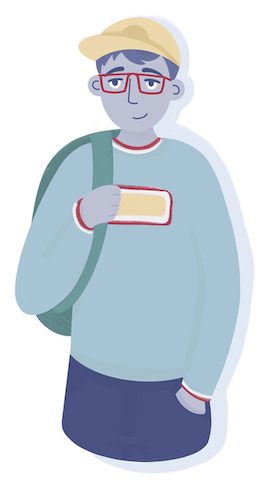 Sleep deprivation is also common among college students, who often juggle coursework, extracurricular activities, part-time jobs, and busy social lives on top of dormitory living, which can be loud and disruptive.
Sleep deprivation is also common among college students, who often juggle coursework, extracurricular activities, part-time jobs, and busy social lives on top of dormitory living, which can be loud and disruptive.
So if you’re feeling sleep deprived, you are most definitely not alone.
What Are The Symptoms Of Sleep Deprivation?
According to the American Academy of Sleep Medicine, the main symptom of sleep deprivation is excessive daytime sleepiness. Being super tired during the day likely signals that you did not get enough rest the night before.
Other signs that you are sleep deprived include: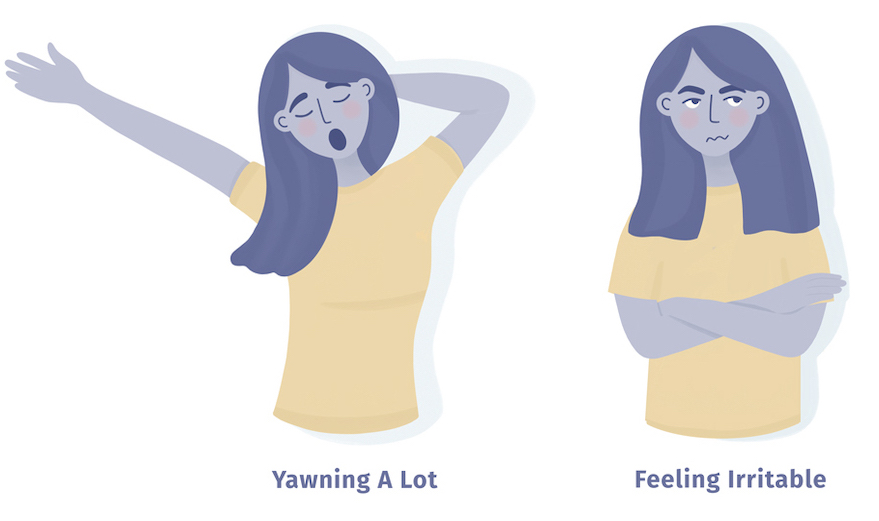
- Having trouble focusing or learning new things
- Forgetting things
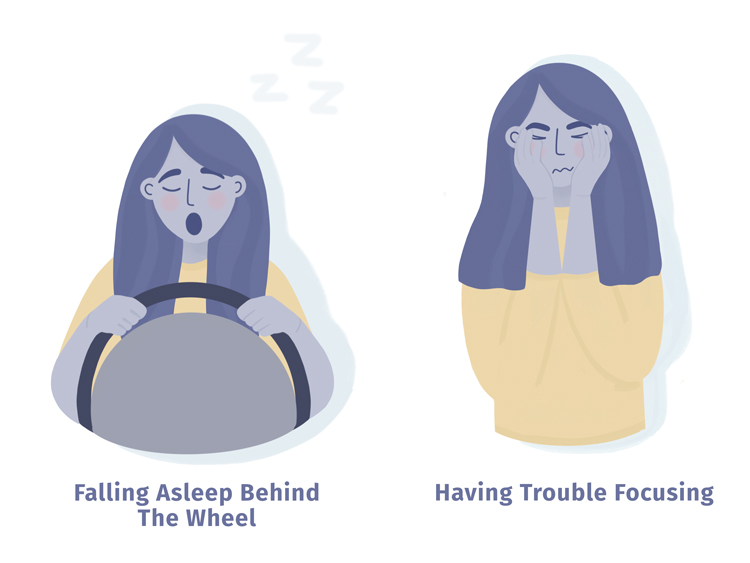
- Falling asleep or feeling drowsy at the wheel of your car
- Making mistakes at work (one particularly scary statistic: The American Sleep Association says “100,000 deaths occur each year in U.S. hospitals due to medical errors and sleep deprivation has been shown to make a significant contribution.”)
How Do You Know If You Are Getting Enough Sleep?
If people want to know whether they’re enjoying adequate rest, they have more options beyond obsessively checking their sleep-tracking smartwatch to see how many hours they logged each night. Here are five signs that people are in fact getting enough sleep.
- You don’t need an alarm to wake up.
- You don’t rely on caffeine.
- You generally fall asleep quickly.
- You don’t wake up for long periods of time during the night.
- You don’t feel sleepy during repetitive tasks or while driving.
Of course, if you aren’t experiencing these things, it could be a sign you have sleep deprivation.
What Causes Sleep Deprivation?
Sleep deprivation can be caused by a variety of factors including medical conditions, sleep disorders, environmental constraints, and busy schedules. Here’s an overview of some of the most common causes of sleep deprivation.
Jam-packed schedules
Many people are sleep deprived because they simply don’t have enough time to get the right amount of sleep.
Let’s say you have a job and two young kids. Your kids wake up early in the morning and need your help up until you head to work. After work, you have to handle school pickup, dinner, and bath time. Even once you hit the sheets, young children might wake you up during the night, thereby interrupting your sleep.
Of course, it’s not just parents who find their schedules are too busy to get enough sleep. A lawyer on a crazy case might work until after 1 am every night. A college student juggling classes, coursework, a busy social life, and extracurricular activities may not prioritize getting enough sleep. And so on.
Lifestyle choices
Your chosen lifestyle can have a big influence on your ability to get enough sleep (or not).
For example, staying out late even though you have to get up early is a surefire way to be sleep deprived. Same goes for reading a great book or staying hooked to a Netflix show until the early hours of the morning.
While some lifestyle factors may be beyond our control, our choices do play a role in how much sleep we get.
Environmental factors
Ideally, the place where you sleep will be dark, quiet, and cool. This isn’t always possible, especially if you work night shifts or live on a noisy street. Light, noise, uncomfortable bedding, and uncomfortable temperatures (whether too hot or too cold) can all interrupt your sleep and cause a lousy night’s rest.
Insomnia
According to the Mayo Clinic, insomnia is a condition where you find it difficult to fall or stay asleep or you wake up too early and can’t get back to sleep. Insomnia can either be short-term (acute), lasting for days or weeks, or long-term (chronic), lasting for months or longer. In many cases, insomnia is related to mental health issues such as anxiety, depression, or stress. It can also be caused by poor sleep habits, medications, or consuming too much caffeine.
The Cleveland Clinic estimates that 50 percent of adults will experience acute insomnia at some point, and that one in 10 people suffer from chronic insomnia. The recommended treatments for insomnia include following good sleep habits, cutting down on caffeine, and working to eliminate stress. In some cases, medication may be required.
Narcolepsy
The Mayo Clinic defines narcolepsy as “a chronic sleep disorder characterized by overwhelming daytime drowsiness and sudden attacks of sleep.” Along with excessive daytime sleepiness, symptoms include a sudden loss of muscle tone, sleep paralysis, and hallucinations.
The National Institutes of Health website explains how the condition can cause sleep deprivation: “Many individuals with narcolepsy also experience uneven and interrupted sleep that can involve waking up frequently during the night.”
Researchers don’t know exactly what causes narcolepsy, but it might be related to a neurochemical called hypocretin, which helps regulate REM sleep. Genetics might also play a role.
Narcolepsy is a chronic disorder with no singular cure, but there are a variety of medications people can take to help manage the condition. Lifestyle changes, such as sticking to a regular sleep schedule and getting regular exercise, can also help.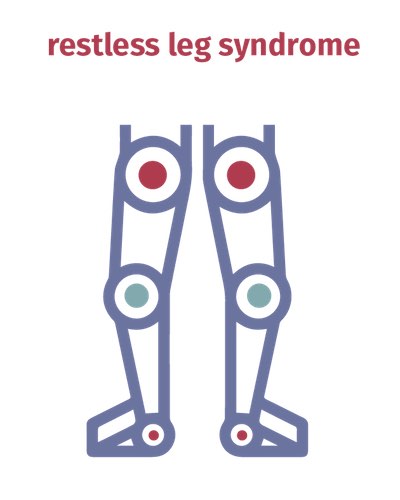
Restless Leg Syndrome
WebMD explains that people who suffer from restless leg syndrome (RLS) experience uncomfortable sensations in their legs (and sometimes other limbs) and feel irresistible urges to move their legs to make the feeling go away.
The symptoms, which are usually worse in the evening or at night, can range from mild to intolerable. Symptoms can make it difficult for people to fall asleep or stay asleep, thus causing sleep deprivation. WebMD estimates that up to 10 percent of the U.S. population suffers from restless leg syndrome, which is more common in women and can develop at any age.
There are some drugs that can help treat the symptoms of RLS. Common at-home treatment options include exercise, massage, putting heat or ice packs on the affected legs, and sticking to a regular sleep schedule.
Sleep Apnea
This is a common condition that occurs when a person’s breathing becomes obstructed or stops during the night, which can disrupt sleep. People who have sleep apnea often feel excessively sleepy during the day because they are not getting the rest they need at night.
The right treatment depends on factors including how severe the apnea is and whether lifestyle changes, such as losing weight, can help address it. Many people with sleep apnea use a continuous positive airway pressure (CPAP) device, which is a mask worn during sleep to keep the airway open and unobstructed. Other treatments include oral appliances to keep the airway open or undergoing surgery to remove obstructive tissue.
Other medical conditions
Other medical conditions that can interfere with your sleep and may cause sleep deprivation include:
- Chronic pain
- Acid reflux
- Thyroid disease
- Anxiety
- Epilepsy
- Allergies
What Are Some Risk Factors For Sleep Deprivation?
In theory, anyone is at risk of sleep deprivation if they don’t get an adequate amount of sleep on any given night — whether that’s because their schedule is too busy, they’re suffering from a sleep disorder or medical condition, or simply because they stayed up too late binge-watching TV.
In addition to these everyday factors, you might be at an increased risk for sleep deprivation if you:
- Are a shift worker
- Are jet-lagged from traveling
- Have an irregular sleep schedule
- Work long, demanding hours
- Suffer from insomnia, RLS, narcolepsy, sleep apnea, or another sleep disorder
- Have a sleeping environment that is not conducive to sleep
- Make lifestyle choices that limit your ability to enjoy adequate sleep
Sleep Deprivation Has Consequences For The Brain And Body
If you don’t get enough sleep, you will likely find it difficult to function during the day. Not only can sleep deprivation make you feel very tired, but it can also cause a variety of other side effects. “Sleep is important for overall health, and inadequate sleep is associated with numerous health problems,” the National Institutes of Health website explains. “Research shows that not getting enough sleep, or getting poor-quality sleep, increases the risk of high blood pressure, heart disease, obesity, and diabetes.”
“Sleep is important for overall health, and inadequate sleep is associated with numerous health problems,” the National Institutes of Health website explains. “Research shows that not getting enough sleep, or getting poor-quality sleep, increases the risk of high blood pressure, heart disease, obesity, and diabetes.”
The CDC reports that “adults who were short sleepers (less than 7 hours of sleep per 24-hour period) were more likely to report being obese, physically inactive, and current smokers compared to people who got enough sleep (7 or more hours per 24-hour period).”
All of this helps explain why sleep deprivation can have negative consequences for the brain and body. After just one night of sleep deprivation, you might:
- Be more likely to get into an accident at work or while driving
- Feel irritable or experience mood swings
- Have trouble concentrating
- Feel very sleepy during the day or find yourself unintentionally falling asleep
- Struggle with physical or athletic performance
People with chronic sleep deprivation may be at an increased risk for:
- Type 2 diabetes
- Trouble losing weight
- Obesity
- Hypertension
- Heart attack
- Stroke
Some research has shown people may even be at-risk of these more serious consequences from non-chronic sleep deprivation. For instance, a new study found that just one night of sleep loss could increase our risk of type 2 diabetes.
Research also shows that both short- and long-term sleep deprivation can affect:
- Your appetite. Sleep affects the levels of a hormone called leptin, which tells your brain when you are full, and ghrelin, which tells your brain when you are hungry.
- Your judgment. “The prefrontal cortex is greatly affected by sleep deprivation,” Shelby Freedman Harris, director of Behavioral Sleep Medicine at Montefiore Medical Center in New York City, told YouBeauty in 2014. “This area is associated with judgment, impulse control, visual association and attention. Less sleep leads to poorer judgment and acting impulsively, such as eating poorly, buying things without thinking about the consequences, and acting irritable or moody with others.”
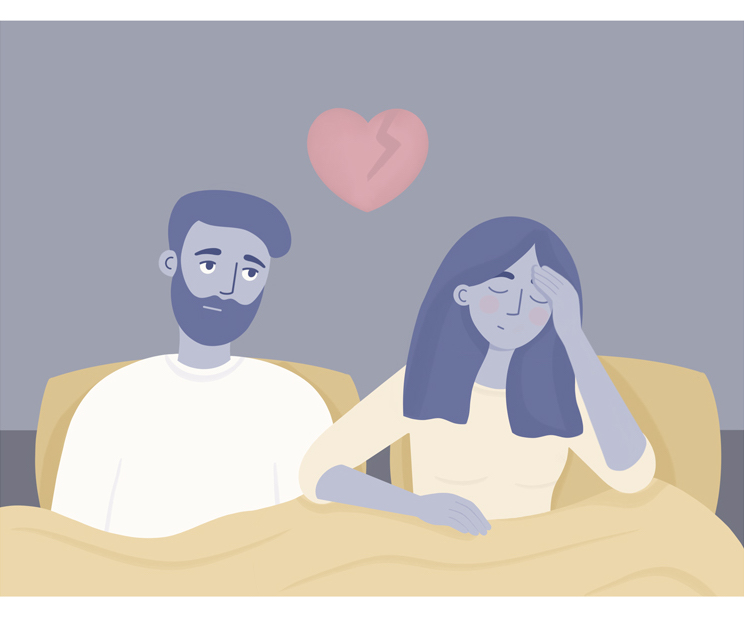
- Your sex drive. A 2011 study found that sleep deprivation can reduce men’s’ testosterone levels, which is “associated with sexual dysfunction.” Women may also experience changes in sexual desire and/or arousal when sleep deprived.
- Your appearance. The Cleveland Clinic explains: “Over time, [sleep deprivation] can lead to premature wrinkling and dark circles under the eyes. Also, research links a lack
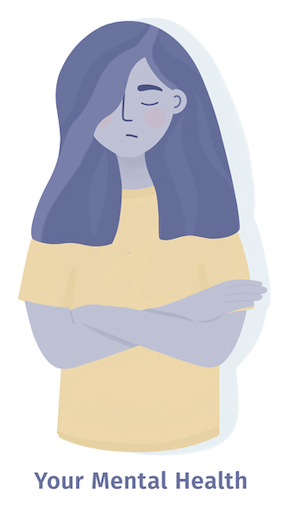 of sleep to an increase of the stress hormone cortisol in the body. Cortisol can break down collagen, the protein that keeps skin smooth.”
of sleep to an increase of the stress hormone cortisol in the body. Cortisol can break down collagen, the protein that keeps skin smooth.” - Your mental health. Sleep deprivation has been linked to anxiety, depression, irritability, and mood swings. Oddly enough, while sleep deprivation can sometimes provoke depression, other people find it useful as a tool for treating depression. One study found that people with depression who were given an antidepressant and subjected to sleep deprivation had higher levels of “brain-derived neurotrophic factor”(low levels of brain-derived neurotrophic factor are associated with depression) than people who only took the antidepressant. However, further research is needed in this area.
- Your regulation of emotions. “Emotion regulation is the ability to effectively manage how we experience and express emotions,” Dr. Amanda Seavey, Ph.D., founder of Clarity Psychological Wellness and a member of the Mattress Clarity Expert Network, told Mattress Clarity via email. “Someone with decreased ability to regulate emotions may feel overwhelmed by emotions and find it difficult not to let those feelings and thoughts control their actions.”
Other Negative Effects Of Sleep Deprivation
In addition to putting you at a higher risk for physical and mental health issues, sleep deprivation may provoke several other negative effects. For example:
Sleep-deprived people might feel lonely and avoid social contact.
A 2018 study found that sleep deprived people might want to distance themselves from social contact and withdraw socially. In a vicious cycle, people who feel socially isolated may have trouble sleeping.
This feedback loop suggests both that sleep deprivation might trigger social isolation and that these feelings of loneliness might be contagious. What’s more, even well-rested people are more likely to feel lonely after encountering a sleep-deprived person.
Sleep deprivation causes drowsy driving, which is very dangerous.
The American Sleep Association estimates that “Drowsy driving is responsible for 1,550 fatalities and 40,000 nonfatal injuries annually in the United States.”
Sleep deprivation might cause relationship issues.
As an article from Psychology Today explains, “Sleep has a big impact on our social relationships, especially our most intimate ones. When one partner has slept poorly the night before, there’s more conflict in the relationship the next day. This is because we have less empathy when we’re sleep deprived, and we’re less likely to engage in effective conflict resolution.”
Sleep deprivation can affect placekeeping.
A study conducted by researchers from Michigan State University’s Sleep and Learning Lab reveals that sleep deprivation may negatively impact our cognitive abilities on a larger scale than originally theorized.
The study is one of the first to look at how a lack of sleep affects placekeeping, a term defined as “the ability to complete a series of steps without losing one’s place, despite potential interruptions,” according to the researchers. Translated into everyday life, placekeeping impacts nearly all aspects of adult life, including activities like driving a car or operating machinery, all of which can have deadly consequences.
Sleep deprivation can make you feel a loss of agency in your life.
A new study in The Journals of Gerontology found that failing to get enough sleep can make it way harder to feel like we’re actually steering our own ships. The study sought to understand whether daily fluctuations in physical and mental wellbeing might affect people’s sense of competency. The researchers found that sleep, mood, and stress can all influence older adults’ feelings of being “in control” of their lives.
Here are some of the other key takeaways:
- Sleep efficacy (or a person’s belief that they’re capable of obtaining a sound night of sleep) was associated with higher feelings of being “in control.” Perhaps not surprisingly, participants who obtained better sleep also demonstrated better cognitive performance and reported greater feelings of overall wellbeing.
- Being in a good mood was also associated with feeling more competent and in control, whereas a bad mood diminished these feelings.
- On days when participants experienced stressful events, they were less likely to feel in control. In many cases, this loss of agency persisted for more than a day.
How To Prevent Sleep Deprivation
The most important thing you can do to prevent sleep deprivation? Do everything in your power to consistently get enough sleep.
Practicing good sleep hygiene may facilitate getting enough sleep. To follow ideal sleep hygiene habits, you should:
- Go to bed at the same time and wake up at the same time every day — even on weekends.
- Sleep in a dark, quiet, and cool room.
- Invest in a comfortable mattress and bedding that suits your sleep style.
- Avoid screens or bright lights before bedtime.
- Set a caffeine cut-off time in the early afternoon.
- Spend time relaxing before bed.
- Develop a regular bedtime routine to signal your body when it’s time to sleep each night.
WebMD also recommends getting regular exercise (though not right before you go to bed, if you can avoid it), eating light meals in the evening, and not overdoing it with alcohol before bed. Even though alcohol can make you feel sleepy, it tends to interfere with your sleep throughout the course of the night.
If you can’t fall asleep or find yourself lying awake, experts say you should get out of bed after 15 to 20 minutes. Do something relaxing, such as listening to music or reading a book, until you feel tired again. Lying in bed watching the clock and stressing about sleep won’t help you at all.
Strategies For Sleep Deprivation Treatment
“The primary treatment of sleep deprivation is to increase total sleep time,” the American Sleep Association explains. “Treating the cause of sleep deprivation is generally the solution to the problem.”
In other words? If you want to sleep more, you first have to figure out why you’re sleeping less. Then take steps to address that root cause. For example:
- If your sleep deprivation is caused by a busy schedule, attempt to rearrange your activities. Can you shorten your commute to work, or commit to getting into bed 20 minutes earlier each night? If you prep breakfast and lay out your clothes ahead of time, can you sleep for an extra half hour in the morning? Take a careful look at how you spend your time to see if there is room for anything to budge.
- If you are sleep deprived because of a medical condition, mention it to the doctor treating you for that condition. Hopefully, treating the underlying condition will also treat the sleep deprivation. Your doctor may also recommend other options, such as a medication, to help you sleep.
- If you are sleep-deprived in the short-term, RISE Science says that catching up on sleep can be helpful: “Recovery sleep, or out-sleeping your sleep need to catch up on lost sleep, works in the short term.”
- For long-term sleep deprivation, the Harvard Health site recommends that you take a vacation for a week or so where you go to bed when you feel tired and get up naturally when you wake up in the morning — no alarm necessary. Sounds nice, right?
RELATED: Guide To Naps
The Bottom Line On Sleep Deprivation
Sleep deprivation is unpleasant but very common.
Symptoms of sleep deprivation include feeling excessively sleepy during the day, feeling moody and irritable, yawning a lot, forgetting things, making mistakes at work, and falling asleep behind the wheel.
Sleep deprivation can be caused by a variety of factors including busy schedules, lifestyle choices, environmental factors, sleep disorders, and other medical conditions. Certain populations, including shift workers and people who work demanding hours, are at a higher risk for sleep deprivation. Sleep deprivation has a number of physical, cognitive, and emotional consequences and can cause problems with your work performance and social life.
Treating any underlying health conditions and sticking to a consistent sleep schedule are good ways to ensure you get sufficient rest. Practice good sleep hygiene and flag any serious sleep issues to your doctor in case you need medical assistance. By making sleep a priority, you’ll improve your performance in every area of your life.
[Editor’s Note: The content provided on this site is for general informational purposes only. Any information provided is not a substitute for professional medical advice. We encourage you to consult with the appropriate health expert if you have concerns.]

